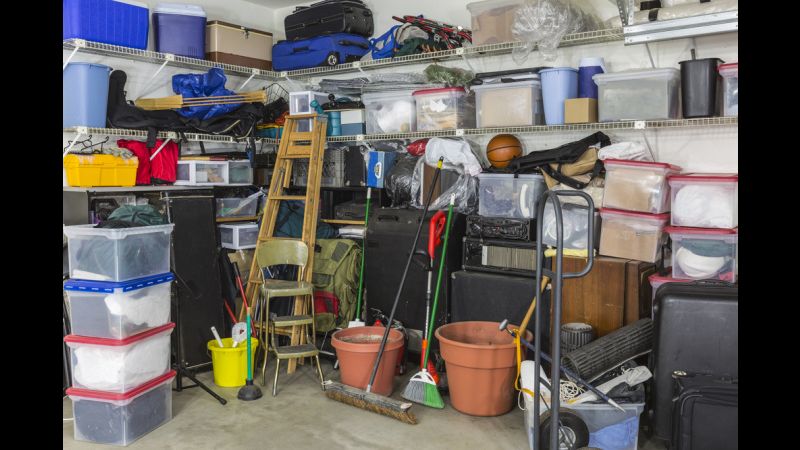Whenever the topic of home safety for the elderly comes up, much attention is focused on taking proper care of the body with a healthy diet and exercise, preventing falls at home and creating a buddy system with a close friend or neighbor. While these are all essential tips that allow seniors to safely age in place, they all overlook another very real threat to a senior’s well-being at home: hoarding.
According to the Anxiety and Depression Association of America, hoarding is a disorder that makes it extremely difficult for a person to part with their possessions, even if those items aren’t valuable. Some of the most commonly-hoarded items include newspapers, magazines, boxes, photographs and plastic bags.
Although these items seem harmless, the buildup of clutter in your home can be a serious safety hazard to all those who live in -- or even visit -- your home.
How a Hoarding Problem Threatens Your Safety
It’s normal to cherish keepsakes that serve as reminders of memories, but when we lose the ability to discard items that we no longer use nor need, and they start piling up around you, that’s when it becomes dangerous. In fact, a hoarding problem is often the result of a deeper underlying health issue, like anxiety, depression, a fear of loss, mental illness or grief.
Not only is it related to mental and emotional disorders, but there are also many physical dangers associated with a hoarding problem, including:
- Accidents and injuries. Falls are much more common in homes that are filled with miscellaneous objects, especially if walking paths are cluttered.
- House fires. If numerous flammable materials accumulate in the home, this poses a serious fire hazard.
- Bacteria. As clutter piles up, cleaning becomes increasingly difficult, which in turn promotes the spread of bacteria and disease throughout the home.
- Lack of care or medical treatment. An immediate response is essential in an emergency, but clutter makes it very difficult for a loved one, caregiver or even an emergency responder to administer proper treatment quickly.
Although hoarding is a serious threat when it comes to home safety for the elderly, the good news is that there are ways you can ensure your safety in and around your house.
Preventing Falls at Home by Clearing Out the Clutter
It can be easy to view the home as a safe haven, especially when it’s filled with treasured keepsakes, but the reality is that six out of ten falls happen at home. Most in-home falls offer from falling or tripping over something, and if you or someone you live with has a hoarding problem, this becomes a much greater risk.
Although removing clutter is one of the simplest things you can do that will play a big role in preventing falls at home, this can seem much more daunting -- or impossible even -- if you or a loved one is suffering from a hoarding problem. And you don’t have to live in a house surrounded by items piled from floor to ceiling to benefit from a thorough cleaning of stuff. Extreme messiness, while not officially hoarding, can still be detrimental to your health. No matter the case behind your desire to tidy up, these tips will help you get the job done:
- Go one room at a time. Creating a schedule that outlines when you will tackle each room will make it much more manageable. Approaching this change slowly can make it easier to bear and less overwhelming as well.
- Ask for help. If you’re still feeling overwhelmed at the thought of clearing out the clutter, enlist the help of a close family member or friend. Remember: they are there to support and encourage you.
- Use a three-bin system. When going through each room, sort items accordingly into three bins: one for keepsakes and valuables, one for donations and one for trash.
- Get creative with keepsakes. Take some time to think about how you want to store the items you place in the keepsake bin so your home won’t get cluttered again. For example, if you have countless family photos, ask a tech-savvy family member or friend to help you set up a digital photo frame. Not only will you be able to view photos that might have been tucked away in a drawer or photo album, but it’ll also allow you to eliminate clutter without losing any precious memories.
- Celebrate each win. When cleaning your home, remember that you are capable of letting go of items, and treat each step you take towards a clutterless home as a victory -- because it is!
Promoting Home Safety for the Elderly
If you believe that you or a loved one may be suffering from a hoarding problem, speak with your doctor, who will help you develop a treatment plan or refer you to a mental health provider. But even if you don’t necessarily have a hoarding problem, investing some time to do some Spring Cleaning around the house is never a bad idea.
Even after clearing your home of clutter, in-home falls and accidents can still happen. Luckily, you can rest assured knowing that you are protected 24/7 with a Medical Guardian medical alert device. Should you ever experience a fall, medical emergency, house fire or power outage, help is always just the push of a button away with Medical Guardian.


